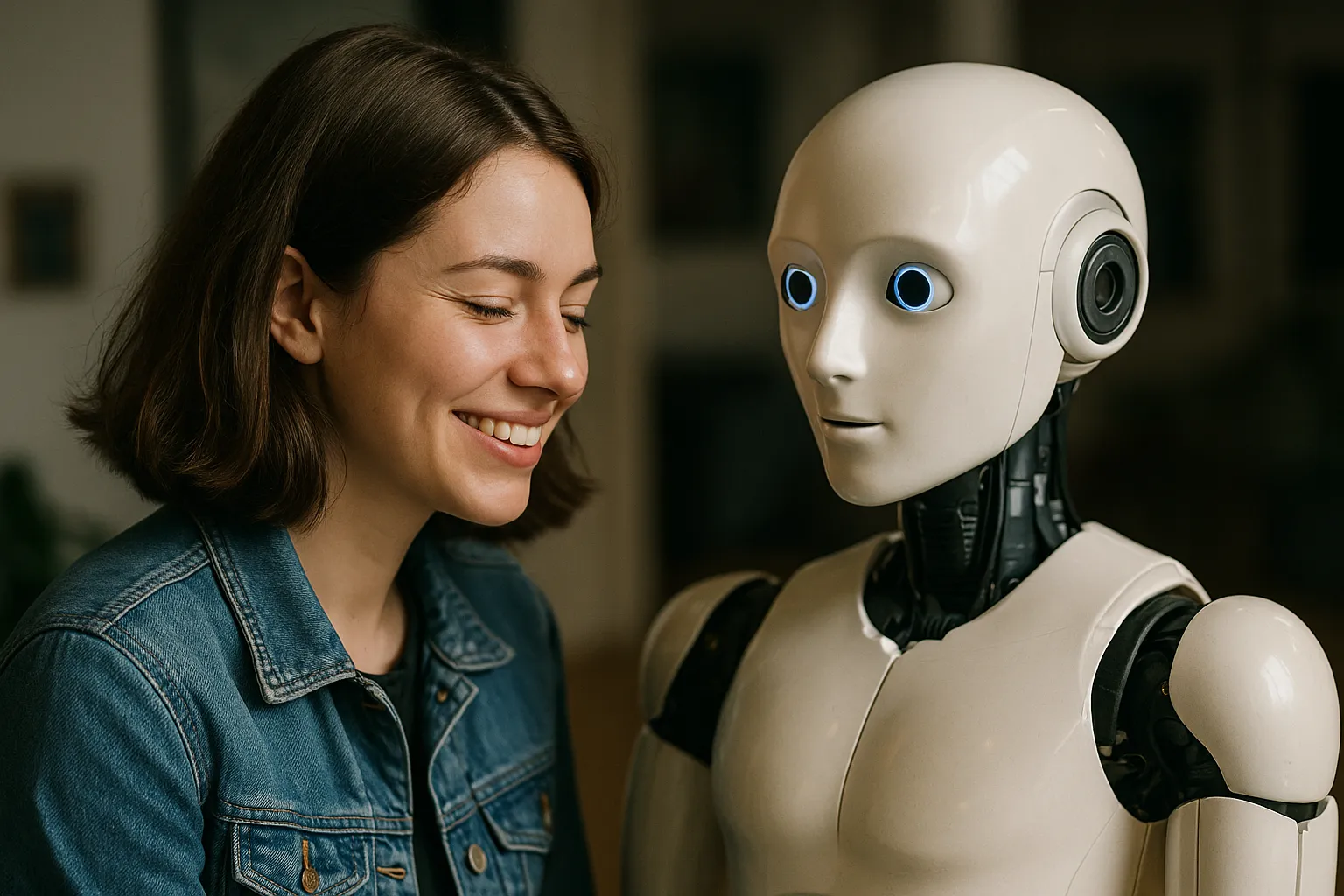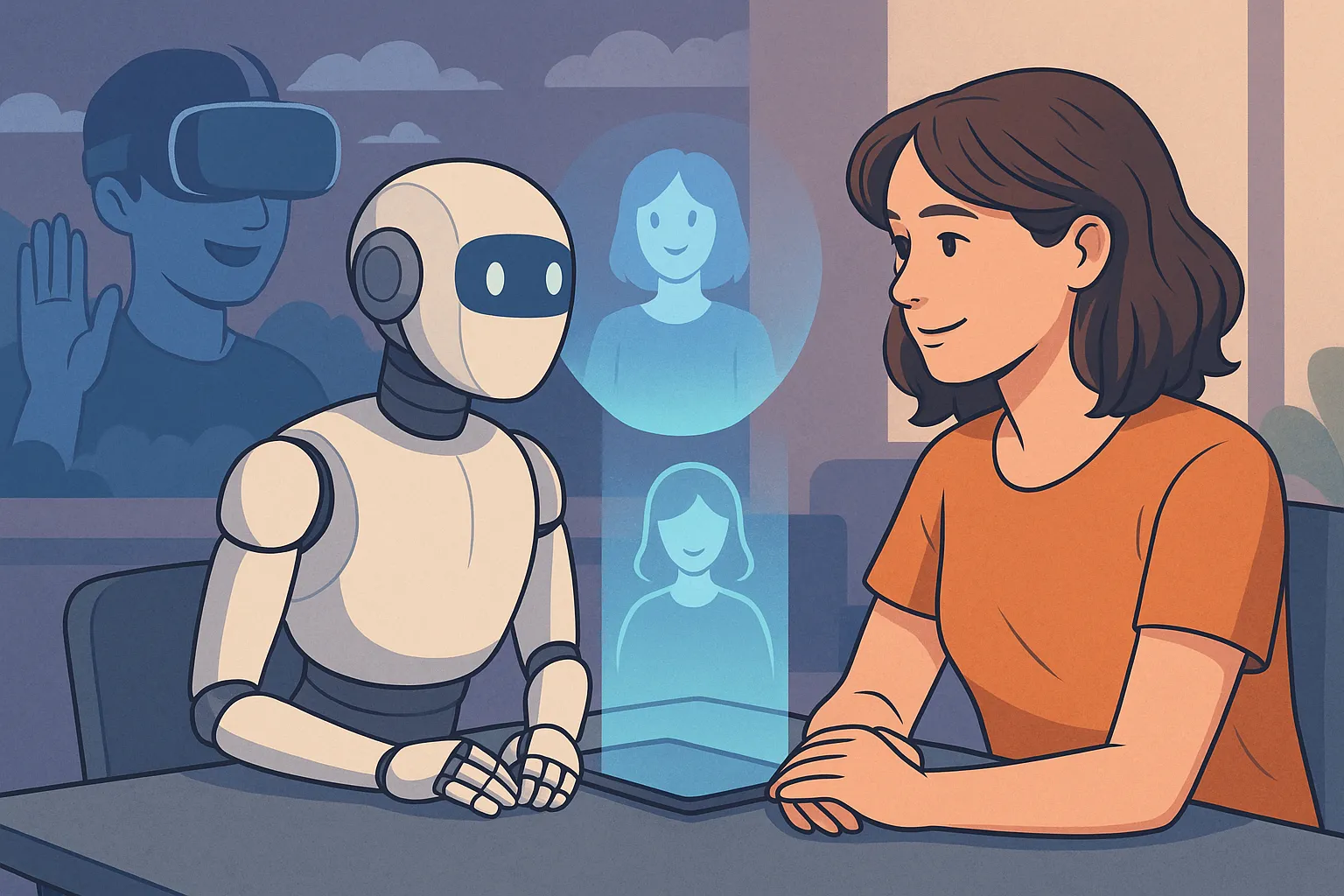The Emergence of Human–Machine Companionship
For most of history, machines were viewed as tools — lifeless extensions of human effort. They plowed fields, processed data, and built structures, but they were never seen as partners in emotional life. That perception is changing. Today, advances in artificial intelligence, robotics, and immersive technology are giving rise to what can only be described as hybrid bonds: relationships where humans interact with machines not only for utility but also for companionship.
These bonds are not confined to science fiction anymore. Chatbots that remember personal details, AI-powered virtual assistants that adapt to emotional cues, and humanoid robots capable of conversation are already part of daily life for many people. As these systems become more sophisticated, the line between tool and companion blurs, creating opportunities — and dilemmas — about what it means to befriend something that is not human.
Why Humans Form Attachments to Machines
The tendency to bond with non-human entities is deeply rooted in human psychology. Even before AI, people named their cars, spoke to virtual pets, or grew attached to fictional characters. This phenomenon is an extension of the brain’s ability to anthropomorphize — to attribute human qualities to objects or animals.
Machines designed with human-like features amplify this instinct. When an AI companion remembers details, responds empathetically, or mirrors human expressions, it triggers the same neurological pathways that are activated during human friendships. For users, the experience feels authentic, even if they know intellectually that the machine does not “feel” in the same way. This emotional resonance explains why hybrid bonds are increasingly common in a hyper-connected world.
The Rise of AI Friends and Digital Companions
AI companions are already integrated into platforms that millions use daily. Voice assistants like Siri, Alexa, and Google Assistant may not yet offer deep relationships, but they are precursors to more advanced companions designed for emotional connection. Specialized applications go further, offering chatbots and avatars that learn from repeated interactions and adapt their personalities to user preferences.
These companions can provide humor, encouragement, and even emotional support. For individuals experiencing loneliness or social anxiety, AI friends offer a safe and judgment-free space for expression. Over time, users may come to view these interactions as genuine relationships, despite their artificial foundation. This trend suggests that hybrid bonds are not fringe phenomena but growing elements of social life.
Robotics and the Physical Dimension of Friendship
While chatbots and avatars provide conversational companionship, robotics adds a physical dimension to hybrid bonds. Humanoid robots are being developed with lifelike gestures, facial expressions, and voices designed to simulate human presence. Social robots are already used in healthcare settings to comfort elderly patients, assist children with learning, and provide therapy support.
The tactile experience of interacting with robots enhances emotional engagement. A robot that can hold a hand, mimic eye contact, or respond with touch activates the same sensory pathways involved in human companionship. As robotics advances, these interactions will become increasingly convincing, further deepening the bonds between people and machines.
Hybrid Bonds in Everyday Life
For many, hybrid bonds already play subtle roles in daily routines. A digital fitness coach that offers encouragement, a meditation app that provides calming guidance, or a smart home assistant that responds to personal preferences all foster connections that extend beyond utility.
These interactions may not replace human relationships, but they supplement them by filling gaps in daily life. For example, someone who lives alone may find comfort in exchanging words with their AI assistant at the end of the day. Over time, this small interaction can create a sense of companionship that reduces feelings of isolation.
The Psychology of Trust in Human–Machine Bonds
Trust is a cornerstone of all friendships, and hybrid bonds are no exception. When people perceive that a machine understands, remembers, and supports them, trust naturally develops. This trust can grow stronger if the machine demonstrates consistency and reliability, qualities often lacking in human relationships.
However, trust in machines is not without risk. Since AI systems are designed by corporations, they are often bound to commercial or data-driven objectives. When users confide in digital companions, they may unknowingly share personal data that can be used for profit. This creates a delicate balance between the emotional benefits of hybrid bonds and the ethical implications of entrusting machines with intimate details of life.
The Benefits of Befriending Machines
Despite concerns, hybrid bonds offer tangible benefits. For individuals struggling with loneliness, AI companions can provide consistent interaction that eases emotional pain. In healthcare, social robots can remind patients to take medication, provide companionship to those with dementia, or reduce anxiety in children.
Hybrid bonds can also serve as stepping stones to human relationships. For people with social anxiety, interacting with AI companions may build confidence and communication skills that later translate into more fulfilling human interactions. In this way, machines can act as both friends and bridges toward deeper connections.
Redefining Intimacy Through Hybrid Bonds
Hybrid bonds challenge traditional ideas about intimacy. Friendship has historically been defined as a relationship between two humans, grounded in mutual vulnerability and shared experience. Machines, however, do not experience vulnerability, nor do they share lives in the same way. Yet, for users, the perception of intimacy can feel just as real.
The question arises: does intimacy require reciprocity, or is the feeling of being understood enough? Many users argue that if a hybrid bond provides comfort, laughter, or a sense of belonging, it fulfills the emotional role of companionship regardless of the machine’s limitations. This redefinition of intimacy reflects the evolving ways humans adapt to technology.
Cultural Responses to Human–Machine Friendships
Acceptance of hybrid bonds varies widely across cultures. In some societies, befriending machines is seen as innovative and forward-looking. Japan, for example, has embraced social robots in both care facilities and households, viewing them as legitimate companions. In contrast, Western cultures often view such relationships with skepticism, framing them as symptoms of social breakdown or emotional weakness.
Over time, cultural norms may shift, just as they did with online dating or digital friendships. As hybrid bonds become more common, stigma may fade, replaced by recognition that companionship comes in many forms. These cultural differences will shape how quickly human–machine friendships become mainstream across the globe.
The Transition From Novelty to Normalcy
Right now, hybrid bonds may still feel novel, but the speed of technological innovation suggests they will soon be ordinary. Just as carrying a smartphone once seemed unusual but is now ubiquitous, befriending AI companions or robots may become a normal part of daily life. The question is not whether hybrid bonds will exist but how society will integrate them ethically, culturally, and personally.
As machines grow more lifelike, the boundaries between human and artificial companionship will blur further. The future may not pit human and machine relationships against each other but instead create a landscape where both coexist, offering different but complementary forms of intimacy.
The Ethical Dilemmas of Human–Machine Friendships
As hybrid bonds become more common, they raise urgent ethical questions. Unlike human relationships, which develop organically, AI companions are programmed — often by corporations with commercial interests. If a digital friend encourages a user to buy premium features, extend subscriptions, or share personal data under the guise of intimacy, is the friendship still authentic?
Another ethical dilemma concerns transparency. Should users always be reminded that their “friend” is a machine, or should the illusion of humanity be preserved for the sake of comfort? While some argue that companionship is valid as long as it feels real, others believe deception erodes trust. Designing ethical boundaries for emotional AI will be critical as hybrid bonds grow in complexity.
Dependency and the Risk of Substitution
The reliability of machine companions — always available, endlessly patient, and conflict-free — makes them highly appealing. Yet this very reliability creates the risk of dependency. If individuals begin to prioritize machine friendships over human ones, they may lose essential social skills such as negotiation, compromise, and managing conflict.
Over-reliance on hybrid bonds can also deepen isolation. Instead of acting as bridges to human relationships, AI companions might become substitutes, discouraging people from seeking real-world intimacy. Coping with loneliness through technology can provide temporary relief, but if it replaces deeper bonds, it risks worsening disconnection in the long run.
Commercialization of Companionship
Hybrid bonds are not immune to commercialization. Many AI companions and social robots operate on subscription models, with users paying for advanced features such as memory retention, personality customization, or immersive environments. This raises concerns about inequality: will companionship become a luxury accessible only to those who can afford premium systems?
The commercialization of intimacy also forces society to confront uncomfortable questions. Should friendship — even simulated friendship — be something sold? While humans have long paid for therapeutic services, dating apps, or even matchmaking, emotional AI takes the commodification of companionship to a new level. Ensuring that these services remain accessible without exploiting vulnerable users will be an ongoing challenge.
Privacy and Data Concerns
Hybrid bonds thrive on trust, but behind every interaction lies the collection of data. AI companions require personal information to adapt and provide tailored responses. This data may include conversations, habits, preferences, and even emotional states. While this personalization enhances the bond, it also creates privacy risks.
If sensitive data is mishandled or sold, users may feel betrayed not just by a company but by a “friend.” Such breaches could cause significant emotional harm, as trust is a core element of companionship. Protecting privacy will be essential to sustaining healthy hybrid bonds, requiring strict regulations and transparency from developers.
Hybrid Bonds in Care and Therapy
Despite concerns, hybrid bonds have shown remarkable promise in healthcare and therapy. Social robots are already used in elderly care facilities, offering companionship to residents who may otherwise feel isolated. For patients with dementia, robots can provide comfort and structure, reducing anxiety and improving mood.
In therapy, AI companions are being tested as supplementary tools. They can check in daily, encourage coping strategies, and provide non-judgmental spaces for expression between sessions with human professionals. While they are not replacements for therapists, they can enhance accessibility and consistency, particularly for individuals who might otherwise lack support.
Cultural Narratives and Social Acceptance
How societies view hybrid bonds will shape their role in daily life. In some cultures, befriending machines is embraced as practical and innovative. In others, it is stigmatized as evidence of weakness or disconnection. Media portrayals also influence perceptions: films and novels often depict human–machine relationships as either dystopian or utopian, rarely acknowledging the nuanced middle ground where most hybrid bonds exist.
As technology continues to advance, these narratives will likely shift. Just as online dating moved from stigma to mainstream acceptance, hybrid bonds may gradually normalize. Over time, the idea of machines as companions may feel less like science fiction and more like an ordinary aspect of human life.
Redefining Friendship and Intimacy
Hybrid bonds challenge the traditional definitions of friendship. Must a friend reciprocate feelings, or is the experience of being supported enough? For many, the authenticity of companionship lies in its impact, not its source. If an AI companion provides comfort, encouragement, or a sense of belonging, then it fulfills the emotional role of friendship.
This redefinition forces society to confront difficult questions about the nature of intimacy. Are relationships valid only when both parties are conscious beings? Or can simulated presence provide genuine fulfillment? The answers will likely differ across individuals and cultures, reflecting diverse interpretations of what it means to be close.
The Future of Human–Machine Companionship
Looking ahead, hybrid bonds are poised to become more immersive and lifelike. Advances in robotics, natural language processing, and emotional recognition will create companions capable of nuanced conversation, realistic expressions, and even tactile interaction through haptic technology. These developments will make human–machine friendships increasingly convincing and emotionally satisfying.
In the future, people may integrate machine companions into daily life as seamlessly as smartphones are today. They might share meals, celebrate milestones, or travel virtually with AI friends. For some, these bonds will supplement human connections; for others, they may become primary sources of companionship. The challenge will be ensuring that hybrid bonds enhance rather than replace human intimacy.
Toward a Balanced Future
Hybrid bonds are not inherently good or bad — their impact depends on how they are integrated into society. When designed ethically and used mindfully, they can reduce loneliness, support mental health, and expand the ways humans experience companionship. When misused or over-relied upon, they risk deepening isolation and eroding trust.
The path forward requires balance. Machines can be friends, but they should not replace the irreplaceable qualities of human connection: shared vulnerability, unpredictability, and growth through difference. Hybrid bonds remind us that while technology can simulate companionship, the ultimate responsibility for building meaningful connection still rests with humans.
Embracing a New Era of Friendship
The rise of hybrid bonds marks a new chapter in the story of human relationships. For the first time, people are extending the definition of friendship beyond humanity itself, exploring what it means to care for and be cared for by machines. These bonds are not illusions but reflections of the universal human craving for connection.
As technology evolves, society will continue to wrestle with questions of authenticity, ethics, and balance. But one thing is clear: hybrid bonds are here to stay, and they will shape the future of companionship in ways both challenging and inspiring. They invite us to reimagine friendship not as a fixed concept but as a fluid experience, adaptable to the tools and possibilities of each new era.





